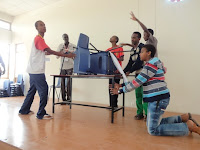

A big part of the YSEL camp is the academic program. Students spend most days studying a
variety of subjects: English, Geography, U.S History, Academic Writing, Public
Speaking, and Reading. Each course
is designed to help students build their English language as well as critical
thinking skills. The YSEL
curriculum is a rigorous program but helps students learn in new ways and be
exposed to new information and ideas.
The approach is very student centered and makes students become active
participants in their own learning—a fairly new concept for many of our
campers.
The teaching team is made up of eight Peace Corps
volunteers, split into two teams of four, teaching for two weeks at a
time. Not only is this a chance
for students to be exposed to native speakers, but this is also a great
opportunity for volunteers to learn new teaching skills that will prove
valuable back in their sites after camp.


Besides the academics, students also have a less academic course during the day we like to call “Enhancement.” This is divided into four subjects: Urban Gardening, Theater, Project Design, and Peace Building. Enhancement classes provide students with a chance to learn new skills that they can use back in their communities. The Urban Gardening component is taught by the JeCCDO staff who have much expertise in this area. Students learn how to bring soil to life and grow things in places that may seem inhospitable. The camp site has a large garden that has been developed to teach people different ways to garden. During the first week of camp, students learned different types of gardening methods and how to compost. They even got their hands dirty by learning how to prepare plots for planting.
Impressions on Urban
Gardening
The first thing that impressed me was the idea of
agriculture. We are thinking
agriculture is only for rural areas, but I learned it can be done in urban
areas. I also learned how we can
use vacant space for making gardens.
Workig in the garden here in Debre Zeyit was a really good experience;
digging the soil and planting. It
was a little difficult but nice.
Nedir Zeki, Harar Region
I was amazed by the urban gardening session. My parents have a garden area, but we
use it in a traditional way so I am happy to learn new, modern ways of
gardening. Also I learned
information how fertilizer is made, how to dig soil, and how to plant
vegetables. By using these
methods, I will teach my family and my community.
Eyerusalem Mamuye, Amhara Region

No comments:
Post a Comment